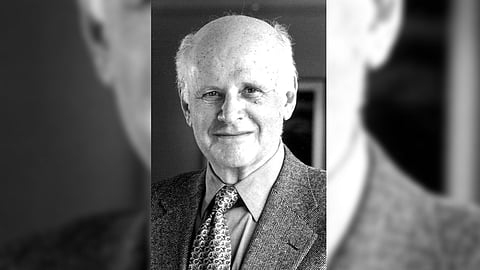

By SAM ROBERTS
NEW YORK: Kurt Gottfried, a theoretical physicist who barely escaped the brutal reality of one World War and devoted his career to preventing another as a co-founder of the influential Union of Concerned Scientists, died on Aug 25 in Ithaca, NY. He was 93.
His death, in a nursing home where he and his wife had been living for the last 10 years, was confirmed by his son, David. Dr Gottfried taught at Cornell University, in Ithaca, for 35 years.
Dr Gottfried, who fled Nazi-controlled Austria when he was 9, became an outspoken opponent of nuclear weaponry, a champion of politically dissident scientists in the Soviet Union and South America, and a fierce critic of the George W Bush administration’s environmental policy, which he said was grounded in research skewed to comport with the White House’s political agenda.
Dr Gottfried and the physicist Henry Way Kendall, his former roommate at the Massachusetts Institute of Technology and a future Nobel laureate, founded the Union of Concerned Scientists in 1969. A non-partisan organisation, it lobbies to shift the nation’s research priorities from military technology to “the solution of pressing environmental and social problems.”
Dr Gottfried said at the time the world was undergoing a transformative revolution driven by “the relentless exploitation of scientific knowledge.”
“But, as with all revolutions, the technological revolution has released destructive forces, and our society has failed to cope with them.”
In 1999, Dr Gottfried became its chairman. He served in that position until 2009.
In 2017, he told MIT Technology Review that his role in creating the organisation “was much more important than any of the science I’ve done.” He rallied fellow scientists in the early 1980s to help derail the Reagan administration’s proposed Strategic Defence Initiative, the ambitious missile defence system that became mocked as a “Star Wars” shield.
They argued that the initiative would be technologically futile, and that pursuit of space-based weapons amounted to an abandonment of the policy of mutually assured destruction, which until then had prevented nuclear conflict.
In an opinion essay in The NYT, he and Hans Bethe, a fellow professor at Cornell, warned the development of anti-satellite weapons “comes close to a declaration of war on the Soviet Union.” In 1983, he and a group of scientists, retired military officers and US senators pressed Washington to open negotiations with the Soviet Union on a treaty that would go well beyond the vaguely worded 1967 agreement to ban the testing and use of weapons, both nuclear and conventional, in outer space.
His concern about nuclear power run amok was driven in part by his association with some of the very scientists who had devised atomic bombs during and after World War II, and who subsequently became alarmed at the weapons’ destructive potential. Among them were Victor Weisskopf, Dr Gottfried’s thesis adviser at MIT; the Nobel laureate Niels Bohr, with whom Dr Gottfried studied in Copenhagen in 1959; and Professor Bethe.
In 2004, complaining that the Bush administration was distorting scientific knowledge, particularly about climate change, Dr Gottfried encouraged the Union of Concerned Scientists to establish a program for scientific integrity, which successfully pressured the federal government to strengthen guidelines for research.
Visit news.dtnext.in to explore our interactive epaper!
Download the DT Next app for more exciting features!
Click here for iOS
Click here for Android